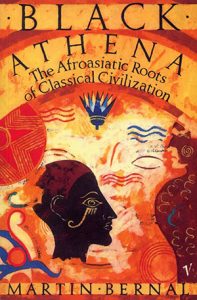Black Athena: The Afroasiatic Roots of Classical Civilization Vol. 1: The Fabrication of Ancient Greece 1785-1985

Author: Martin Bernal
Publisher: Vintage
Year of Publication: 1991 (Reprinted Ed.)
Print Length: 608 pages
Genre: Non-Fiction / History, Geography, Political Science, Social Science
Area: Greece, Egypt, Palestine / Israel, The Levant, Europe, The Middle East, North Africa
Topic: Egyptian, The Semites, Greek, History, Civilization, Cultural Heritage/Legacy, Culture & Society, Geopolitics, Movement of People and Ideas, Migration, Mobility & Immobility, Politics & Power
A challenge to the whole basis of thinking on the subject of classical civilization. The author argues that it has its roots in Afroasiatic cultures, and that these influences have been systematically ignored, suppressed or denied since the 18th century. Winner of the American Book Award, 1990.
Could Greek philosophy be rooted in Egyptian thought? Is it possible that the Pythagorean theory was conceived on the shores of the Nile and the Euphrates rather than in ancient Greece? Could it be that Western civilization was born on the so-called Dark Continent? For almost two centuries, Western scholars have given little credence to the possibility of such scenarios.
In Black Athena, an audacious three-volume series that strikes at the heart of today’s most heated culture wars, Martin Bernal challenges Eurocentric attitudes by calling into question two of the longest-established explanations for the origins of classical civilization. The Aryan Model, which is current today, claims that Greek culture arose as the result of the conquest from the north by Indo-European speakers, or “Aryans,” of the native “pre-Hellenes.” The Ancient Model, which was maintained in Classical Greece, held that the native population of Greece had initially been civilized by Egyptian and Phoenician colonists and that additional Near Eastern culture had been introduced to Greece by Greeks studying in Egypt and Southwest Asia. Moving beyond these prevailing models, Bernal proposes a Revised Ancient Model, which suggests that classical civilization in fact had deep roots in Afroasiatic cultures.
Provocative, passionate, and colossal in scope, this volume caps a thoughtful rewriting of history that has been stirring academic and political controversy since the publication of the first volume.
“A work which has much to offer the lay reader, and its multi-disciplinary sweep is refreshing: it is an important contribution to his to historiography and the sociology of knowledge, written with elegance, wit, and self-awareness… a thrilling journey… his account is as gripping a tale of scholarly detection and discovery as one could hope to find.” — Margaret Drabble, The Observer
“An astonishing work, breathtaking bold in conception and passionately written… salutary, exciting, and in its historiographical aspects, convincing.” — G. W. Bowersock, Institute for Advanced Study, Princeton
“The next far in book…. A formidable work of intellectual history.” — Christian Science Monitor
Table of Contents
Preface and Acknowledgements
Transcription and Phonetics
Maps and Charts
Chronological Table
INTRODUCTION
Background
Propose historical outline: Black Athena, Volume 1: a summary of the argument / Greece European or Levantine? The Egyptian and West Semitic Components of Greek Civilization, a summary of Volume 2 / Solving the Riddle of the Sphinx and Other Studies in Egypto-Greek Mythology, a summary of Volume 3
1. THE ANCIENT MODEL IN ANTIQUITY
Palesgians / Ionians / Colonization / The colonizations in Greek tragedy / Herodotos / Thucydides / Isokrates and Plato / Aristotle / Theories of colonization and later borrowing in the Hellenistic world / Plutarch’s attack on Herodotos / The triumph of Egyptian religion / Alexander son of Ammon
2. EGYPTIAN WISDOM AND GREEK TRANSMISSION FROM THE DARK AGES TO THE RENAISSANCE
The murder of Hypatia / The collapse of Egypto-Pagan religion / Christianity, starts and fish / The relics of Egyptian religion: Hermeticism, Neo-Platonism and Gnosticism / Hermeticism — Greek, Iranian, Chaldaean or Egyptian? / Hermeticism and Neo-Platonism under early Christianity, Judaism and Islam / Hermeticism in Byzantium and Christian Western Europe / Egypt in the Renaissance / Copernicus and Hermeticism / Hermeticism and Egypt in the 16th century
3. THE TRIUMPH OF EGYPT IN THE 17TH AND 18TH CENTURIES
Hermeticism in the 17th century / Rosicrucianism: Ancient Egypt in Protestant countries / Ancient Egypt in the 18th century / The 18th century: China and the Physiocrats / The 18th century: England, Egypt and the Freemasons / France, Egypt and ‘progress’: the quarrel between Ancients and Moderns / Mythology as allegory for Egyptian science / The Expedition to Egypt
4. HOSTILITIES TO EGYPT IN THE 18TH CENTURY
Christian reaction / The ‘triangle’: Christianity and Greece against Egypt / The alliance between Greece and Christianity / ‘Progress’ against Egypt / Europe as the ‘progressive’ continent / ‘Progress’ / Racism / Romanticism / Ossian and Homer / Romantic Hellenism / Winckelmann and Neo-Hellenism in Germany / Göttingen
5. ROMANTIC LINGUISTICS
The rise of India and the fall of Egypt, 1740-1880 / The birth of Indo-European / The love affair with Sanskrit / Schlegelian Romantic linguistics / The Oriental Renaissance / The fall of China / Racism in the early 19th century / What colour were the Ancient Egyptians? / The national renaissance of modern Egypt / Dupuis, Jomard and Champollion / Egyptian monotheism or Egyptian polytheism / Popular perceptions of Ancient Egypt in the 19th and 20th centuries / Elliot Smith and ‘diffusionism’ / Jomard and the Mystery of the Pyramids
6. HELLENOMANIA, 1
The fall of the Ancient Model, 1790-1830 / Friedrich August Wolf and Wilhelm von Humboldt / Humboldt’s educational reforms / The Philhellenes / Dirty Greeks and the Dorians / Transitional figures, 1: Hegel and Marx / Transitional figures, 2: Heeren / Transitional figures, 3: Barthold Niebuhr / Petit-Radel and the first attack on the Ancient Model / Karl Otfried Müller and the overthrow of the Ancient Model
7. HELLENOMANIA, 2
Transmission of the new scholarship to England and the rise of the Aryan Model, 1830-60 / The German model and educational reform in England / George Grote / Aryans and Hellenes
8. THE RISE AND FALL OF THE PHOENICIANS, 1830-85
Phoenicians and anti-Semitism / What race were the Semites? / The linguistic and geographical inferiorities of the Semites / The Arnolds / Phoenicians and English, 1: the English view / Phoenicians and English, 2: the French view / Salammbô / Moloch / The Phoenicians in Greece: 1820-80 / Gobineau’s image of Greece / Schliemann and the discovery of the ‘Mycenaeans’ / Babylon
9. THE FINAL SOLUTION OF THE PHOENICIAN PROBLEM, 1885-1945
The Greek Renaissance / Salomon Reinach / Julius Beloch / Victor Bérard / Akhenaton and the Egyptian Renaissance / Arthur Evans and the ‘Minoans’ / The peak of anti-Semitism, 1920-39 / 20th-century Aryanism / Taming the alphabet: the final assault on the Phoenicians
10. THE POST-WAR SITUATION
The return to the Broad Aryan Model, 1945-85 / The post-war situation / Developments in Classics, 1945-65 / The model of autochthonous origin / East Mediterranean contacts / Mythology / Language / Ugarit / Scholarship and the rise of Israel / Cyrus Gordon / Astour and Hellenosemitica / Astour’s successor? — J. C. Billigmeier / An attempt at compromise: Ruth Edwards / The return of the Iron Age Phoenicians / Naveh and the transmission of the alphabet / The return of the Egyptians? / The Revised Ancient Model
CONCLUSION
Appendix: Were the Philistines Greek?
Notes
Glossary
Bibliography
Index

Martin Bernal is a British-born and Cambridge-educated polymath who taught Chinese political history at Cornell from 1972 until 2001. His three-volume work “Black Athena” ignited an academic debate by arguing that the African and Semitic lineage of Western civilization had been scrubbed from the record of ancient Greece by 18th- and 19th-century historians steeped in the racism of their times. He did not claim that Greek culture had its prime origins in Africa, as some news media reports described his thesis. He said only that the debt Greek culture owed to Africa and the Middle East had been lost to history.
Source: https://www.theguardian.com/education/2013/jun/21/martin-bernal
More from Martin Bernal in this library, click here.
